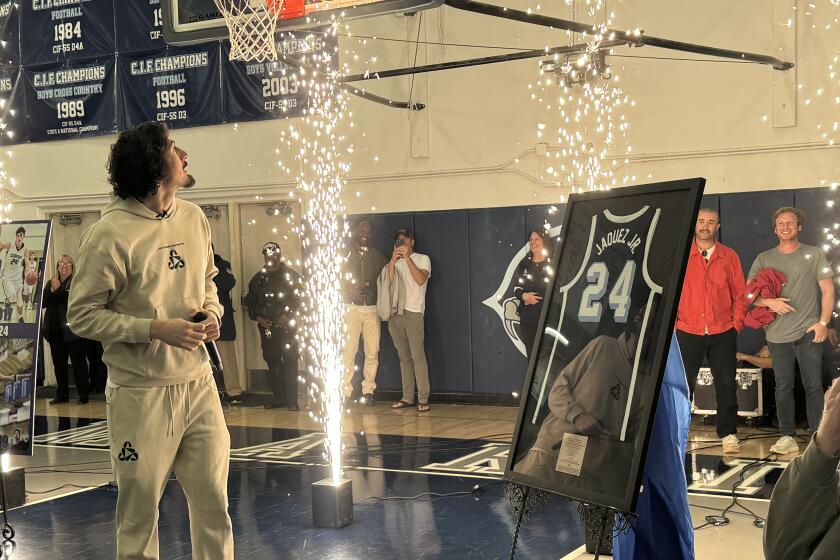Leftist Uprising
MALIBU — Folks in Tennessee like to say Jan van Breda Kolff took off for the Left Coast. They have no idea how right they are.
In his first practice as Pepperdine coach after six years at Vanderbilt, van Breda Kolff had to rub his eyes.
Forward Tommie Prince took a shot. Left-handed.
Kelvin Gibbs, the other forward, fired off a jumper. Left-handed.
Center Nick Sheppard was next. Left-handed.
Guard Brandon Armstrong let loose a three-pointer. Left-handed.
Van Breda Kolff couldn’t believe it. He resisted the temptation to cover his eyes as point guard Tezale Archie shot.
Right-handed. Whew.
Van Breda Kolff, a consummate Xs and Os man, immediately decided to turn an oddity into an advantage. He devised plays to fit the personnel.
Left, left, right, left, left . . .
The Waves have marched to their first West Coast Conference championship since 1993 with a 12-2 record. They are 22-7 overall and, because of a strong nonconference schedule, have a healthy power ranking of No. 44 entering the WCC tournament Saturday at Santa Clara.
“Most plays are designed to get the ball on one side of the court,” van Breda Kolff said. “On this team, they like the ball on the left side of the post.”
Archie, a fifth-year senior enjoying a breakout season, has reveled in feeding teammates whose strengths are opposite those of most players. The left-handers break off of screens to their left for shots and make moves in the post opponents don’t expect.
“It’s crazy,” Archie said. “The plays are opposite. We line up on the left side and lob to the left side of the basket. Brandon and Tommie slide in from the right side with their floaters. I had to adjust. We had a lot of open gym time to get a feel for each other.”
Pepperdine’s primary reserves, Craig Lewis and David Lalazarian, are right-handed. But they are no less effective. The Waves’ top seven players average between 7.5 and 14 points.
Lalazarian believes that having left-handed teammates is a plus.
“I think teams are confused scouting us,” he said. “It’s an adjustment they all have to make.”
The Waves know all about adjustments. They made several when van Breda Kolff took over, slimming down and revving up their motors to fit his up-tempo scheme of multiple presses and a match-up zone defense.
Gibbs, a 6-foot-8 junior who was All-WCC last season, and Sheppard, a 6-11 transfer from Louisiana State, each willingly dropped 20 pounds. Gibbs’ scoring average dropped as well because van Breda Kolff emphasized a more balanced offense than his predecessor, Lorenzo Romar.
“He got all the preseason accolades, and his role would have been to score 15 to 18 points and get 12 rebounds a game,” van Breda Kolff said of Gibbs. “For my system to work, Kelvin had to give that up.
“He’s the only guy scoring less than last year. Yet the team has had more success for his sacrifice. He’s the one I’ve most enjoyed.”
Gibbs’ teammates appreciate his selfless approach.
“If Kelvin wasn’t such a team player, we wouldn’t be where we are,” Archie said. “He deferred to his elders when he could be demanding the ball, and rightly so.”
The scoring balance was reflected in All-WCC selections. Archie, Gibbs and Armstrong made the team, but Kenyon Jones of fifth-place San Francisco was chosen player of the year.
For van Breda Kolff’s system to work, egos had to be suppressed. Gibbs set the example and everyone else followed.
“We have strong personalities, but no egos,” Archie said. “There are no ulterior motives. Nobody is trying to jack up their numbers so they can make the [NBA]. Everybody is about winning.”
And learning. Pepperdine runs more than 40 offensive plays and employs a variety of defenses, including a match-up zone, half-court and full-court traps, and a three-quarter-court press.
“I wasn’t sure we could introduce everything this season,” van Breda Kolff said. “But the players’ enthusiasm for the system has made teaching easier. They’ve picked it up very quickly.”
Pepperdine forces 20 turnovers a game, including 9.1 steals, leading the WCC in both categories. Four Waves rank in the WCC top 10 in steals, with Archie tied for the lead at 2.4 per game.
The Waves allow 62 points a game, second-best in the conference.
“These defenses work and we all recognized that early on,” Archie said. “Our match-up zone is not a sit-back zone. We contest every shot. We plug up the high post, then have five guys crashing the boards.”
Opponents that rely on one or two scorers are greeted by the Waves’ box-and-one or triangle-and-two defense. Prince, the WCC defender of the year last season, usually covers the top scorer, although Armstrong has also drawn the assignment.
On defense or offense, a different player seems to step up every game.
Left, left, right, left, left . . .
“So many left-handed shooters was to our advantage early, but is less so now because we are playing teams for the third time,” van Breda Kolff said. “Maybe a defender goes up with the wrong hand. Maybe we get a step quicker on a post move.
“It’s one more thing teams have to consider.”
Against a team with as many weapons as Pepperdine, it usually proves one too many.
WEST COAST CONFERENCE
Men’s Tournament
Saturday
in Santa Clara
*
Regular season champion:
Pepperdine
22-7 overall, 12-2 in conference
More to Read
Go beyond the scoreboard
Get the latest on L.A.'s teams in the daily Sports Report newsletter.
You may occasionally receive promotional content from the Los Angeles Times.











